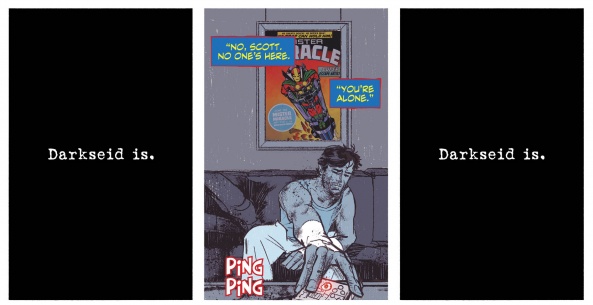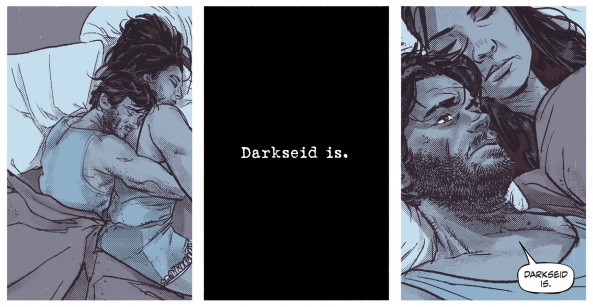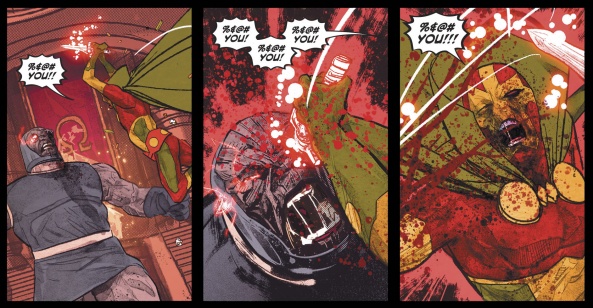I used to be a voracious reader.

I wanted everything. Give me your crises both infinite and final; give me your wars both secret and civil. As many panels as possible: splash pages, weird grids, blurred lines and experimentation. If it was 4-color and sequentially stapled together in a 20+ page floppy released on a Wednesday, I would consume it as fast as I could.
Hell, figure out how to stick it into a movie or a TV show and I’d watch that too! Put on a different show every night, it’s no bother; I’ll carve out the time every night. I’ll go to your opening nights, even when they switch to Thursdays. Franchise films, trilogies, and franchise film trilogies followed by prequels? I mean, that’s exactly what led to this site, let alone what drove me from 2009 to somewhere in 2015.
But as time’s arrow marched forward, I followed less and less. While not directly related to comics, the further I get into adulthood the more I find that the choices my life confronts me with over time exacerbates certain mental health issues I’d faced all my life, leading to a lot of general lethargy about how I consume my media. You’d have thought I’d have seen it coming (cough), but as much as I had felt I had gotten my consistent state of existential dread under control, my overall state of depression and ennui after crossing my quarter life threshold (compacted with other things that I won’t write about here but have written about elsewhere) ultimately led to the end of my relationship with this site — and, to be honest, my relationship with comics and comics media a few years later.
I don’t think I’ll ever quit comics wholesale, or even superheroes, but I don’t get as much joy from them anymore. 2018 is emblematic of that: books that I thought I’d always read, characters and teams I always thought I’d care for no longer find a home in my apartment month after month. I can’t keep up with the big events or weekly comics; I similarly lose interest reading summaries of the events that introduced a brand new character or shattered the universe or … whatever else. Instead, this year I started getting rid of my collection; when I moved earlier this year I didn’t take my collection with me. I loaded up 40 some-odd longboxes into a friend’s van and dropped them off in storage, with no real interest in revisiting them (though when I do, it’ll be to catalogue and sell them). 2009-Me is still in shock over it.
So I don’t really read as many comics.
I definitely don’t watch all the shows.
I am no longer a voracious reader.
But… I am still a fan. And this is a comics site after all, not my personal blog.
So what brings me here today?

When Brian asked folks at the site to look back at our Year In Comics and challenged us to figure out what mattered to us, I took a long hard look at what remained in my pull. I tried to figure out what I still talk to people about, what brings me to the shop month after month. What I found when looking at the books that stuck with me, that led to the most discussion between me and my comic reading friends, is that the comics I now connect with are less about costumes and calamity but more about quiet, tender, painfully human moments. And if I’m being really honest: my #1 favorite book of the year, the one that spoke the loudest to me, turns out to still be a superhero comic — a superhero comic where the moments surrounding the super human lose the adjective, and remain just human.
So to put it plainly: “Mister Miracle” was probably the most important book to me this year.
Why?
The loss of comics from my life aside, this year I finally started to find some stability in my life. Things in my personal life started to click a bit more; there were struggles, assuredly, but things were markedly different — and more often than not, better. I made a conscious effort to “be better”; I opened up more to friends, colleagues and family about my struggles, and spent less time alone. I played a lot of Overwatch and started a new podcast. My job started to make sense, and I started to take online classes to get better at what I do. I made a concerted effort to be friendlier and less angry / spiteful everywhere, especially online (looking at you, Twitter). I went out a lot more — to dinner, to concerts, to parties. I traveled some. I took more time for me, tried to stop leaving myself in my shell. And most importantly I got married to the most important person in my life in a ridiculously fun and complex DIY wedding full of moments I’ll always remember and cherish (with a whole bunch of Multiversity past and present there as well).
Continued belowBut all year, something has still felt… off.
It’s hard to explain. Even if my pocket of it is kind of okay, when I say that something feels off I don’t mean to discuss what is wrong, or what went wrong; it’s more that, there’s this feeling that something has to be wrong. I mean, that’s been the main constant of my entire life, right? Something being wrong. So it doesn’t make sense that there wouldn’t be something wrong in my life. Something has to be wrong somewhere, and there’s just so much wrong in the world, so much going on around me at all times, so clearly something is wrong.
But I can’t see it. I can hear it, but I can’t see it. I know it’s there.
So how do I figure out what’s wrong? How do I get away from it? Isn’t there something I need to solve, to figure out?
Shouldn’t I have to escape from something?
That’s why “Mister Miracle.”

Tom King loves Broken Things, and dissecting why they broke.
King first made a name for himself by writing about the Ordinary in the world of the Super with his novel “A Once Crowded Sky” (which I also read this year, and similarly enjoyed). But in comics most people took notice of this with “The Vision,” his only title for Marvel Comics. King took a character that had historically done everything to fit in amongst his peers to a somewhat logical extreme: the Vision is going to start a family and settle down. Behold… The Visions! What used to make the Vision extraordinary is abandoned as the extra is shed in an attempt to build his own iteration of the ordinary, adulthood dream of stability — only to find that the cracks left in the foundation were wider than they seemed. King’s writing and Walta’s artwork on that book brings the story of the Visions to life in a visceral way that connected with not just myself but many fans as well, as the busted Americana of it all reflected back to us the fears that come with settling down, all from a most unlikely candidate.
In “Mister Miracle,” King continues his love of Broken Things, now through the lens of a man obsessed with escaping. Scott Free has it all: a loving wife, fame and fortune, good friends, and mid-way through the series a baby on the way (two by the end!) — and yet there’s something off about his reality. This is why the book opens with Scott sitting on the bathroom floor, bleeding out with his wrists slit. What follows is a slightly surreal odyssey, one where the panels crackle and break as Scott traverses his reality and balances his career (as an escape artist and a general) and his personal life / the birth of his son in the middle of a grand war in his homeworld. Over the course of the book we watch as Scott deals with his life as both a New God and the son of the High Father, as well as grappling with his legacy as a warrior and the adopted son of Darkseid.
His life is in a constant warring state — and yet nothing seems to hurt Scott more than the dread that comes from two words that follow him around to remind him nothing is ever okay: “Darkseid is.”

What made “Mister Miracle” work — and ultimately what connected with me — was the way it tackled a question that I find hard to deal with in my own life: how do you live a normal, happy life when you get so used to life being defined by some kind of struggle or turmoil? What do you do when there is that voice that’s always there to remind you of that? How do you tackle it, drown it out with other things? What do you do when all that fails you feel like giving in?
What is the self-fulfilling narrative vs. something you have no control over?
“Mister Miracle” came out at a time where I was really struggling with balancing my own version of “Darkseid is.” on a regular basis. I wrote a bit about it at the beginning of the year, there’s still this ever-present voice in the back of my mind that tells me I’m not strong enough, I’m not good enough, that I don’t deserve the life I have, that I’ll never get the things I’m working toward. And when you live with that voice, or that hole in your chest, or whatever you want to call it, it sometimes feels like it doesn’t matter how hard you try, or how much you work on yourself; that voice is so loud and so powerful that it’s hard to tune out. The voice that tells you to quit your job, to stop trying, to not get out of bed today.
Continued belowAnd sure, you spend time with your loved ones, you go out with your friends, you tell stories and anecdotes while spitting off bridges and into pits to drown it out and pretend it’s not there — but the voice is back when you close your eyes at night, surrounded by silence and darkness.
Darkseid is.
“Mister Miracle” builds upon the mythos built by Jack Kirby in his prime and tackles this depression through the visage of the DCU’s most frightening villain. Darkseid is many things, but Darkseid is probably the ultimate Big Bad; the master of the Anti-Life equation, the bringer of the Final Crisis, etc. In modern New 52 continuity Darkseid is the alpha and the omega; the one who brings the Justice League together, and the one who causes the war that brought about Rebirth. Who better to represent not just literal dread but metaphorical, existential dread as well?
While Kirby’s original work was more religious allegory, King and Gerards’ take is certainly as metaphorical and experiential as Kirby’s, though all of the references and analogies are made modern. Through King and Gerards’ use of the 9-panel grid structure, the book is defined by the way it handles the quiet moments betwixt the gutters of panels that are pulled apart and extrapolated upon. King’s work is often full of these quiet narratives; long, drawn-out and poetic / repetitive soliloquies that isolate the minutiae of existence, but I found myself specifically connecting with “Mister Miracle” more than other similar examples of his work throughout the year. The way Scott and Barda work together and make plans or talk reminds me of my wife; the issue where Scott goes drinking with Booster and Blue Beetle for a few pages reminds me of late nights with the best men at my wedding. Hell, even Scott growing a beard throughout all of the events of this book reminds me of the last 6 years and the mound of hair growing off my chin.
Throw the recurring “Darkseid is.” on top of it all and you’ve got a story I can really see parts of myself in. Friends, family, work, life… all of it is followed by “Darkseid is.”, that lingering, deep-rooted constant. The stuff that happens to you, the stuff you do to yourself… “Darkseid is.” It’s practically a mantra.
Together, King and Gerards fill the book with not just superheroics but also the mundane and benign interactions of existence that capture a particularly reflective piece of humanity for me. It’s one that doesn’t typically fit into a genre that’s quite often defined by how hard someone can punch another person or entity in the face, but when it’s used and it’s done effectively, it can feel very prescient.
And, hey, don’t get me wrong, “Mister Miracle” has punching. Plenty of it, really:

But by the time Scott is actually battling Darkseid, the sequence is less about how hard Scott hits him in the face and more about everything that surrounds the sequence: his love of his son, his care for his family, his defiance towards his history, his rejection of the destiny presented to him; everything he wants, that should make up his reality. Scott isn’t just fighting the most powerful being in the galaxy, Scott is fighting everything he’s been faced with in the past and everything he continues to be faced with — and he’s doing his best to (pun intended) escape from all of it. He’s literally fighting everything that we are figuratively presented in terms of what makes up “what is wrong” with him.
And that’s what makes a book like this powerful for a person like me: if a superhero can do it thanks to visual allegory while wearing t-shirts to work every day, maybe I can too?
The series culminates in a dreamlike finale which presents to the reader one final question: what actually happened? Was this his real life? Was it just fantasy? Scott may have been caught in a landslide of events, but did he escape from reality?
I’m not sure that it matters.
New reality or not, it’s the journey not the destination that matters here. And no matter how many times Scott is faced with or puts himself in danger he finds the strength to get by and carry on.
Continued belowSo the question I ask is: while “Darkseid is.” is a stand-in for many things, is “Darkseid is.” a crutch?
Maybe it’s more about the balance of what Darkseid is and what Darkseid isn’t, rather than just falling victim to that sound blaring through the megaphone buried in the back of my mind. Maybe, no matter how many times we put ourselves in danger, it’s actually about finding strength in those we love, and those who love us, and holding onto that.
Maybe it’s OK that sometimes things are going well, and maybe I shouldn’t have to escape from everything.
I used to be a voracious reader, but these days, if I’m going to invest in a character or a book, I’m more interested in comics as that form of reflection.
While to many comics are a form of escapism, I want to look in these books and find where I can see myself. It may seem cliche, but often times good fiction strikes us in just the right spot to help us understand and comprehend the struggles we face. Comics have done that for me before, and I’m sure they’ll do it again in the future, and “Mister Miracle”is perhaps the only book that has truly provided that this year. Wrapped up in a sense of poignant existentialist dread, and showcased through the beautiful artwork of Mitch Gerards via the consistent and repetitive 9-panel grid, “Mister Miracle” is just as much about about the fear of growing old and starting to come to grips with what your life has been and will forever be as it is about learning to stop believing in the lies that your brain tells you.
It’s a book that starts in a grim and impossibly dark place, but it ends somewhere closer to the light. “Mister Miracle” finds Scott Free learning to hear “Darkseid is.” less, and remember that he is too.
And to that, I can very much relate.







